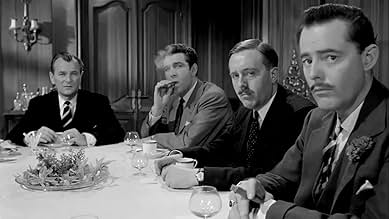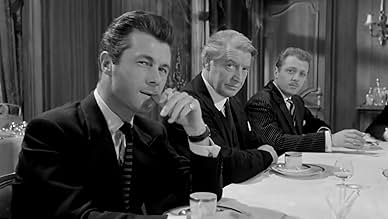NOTE IMDb
7,2/10
5,6 k
MA NOTE
Récemment mis à la retraite, le lieutenant-colonel Hyde décide de se venger et réunit sept officiers renvoyés de l'armée pour commettre un casse.Récemment mis à la retraite, le lieutenant-colonel Hyde décide de se venger et réunit sept officiers renvoyés de l'armée pour commettre un casse.Récemment mis à la retraite, le lieutenant-colonel Hyde décide de se venger et réunit sept officiers renvoyés de l'armée pour commettre un casse.
- Réalisation
- Scénario
- Casting principal
- Nomination aux 1 BAFTA Award
- 1 victoire et 1 nomination au total
John Adams
- Police Constable in Final Scene
- (non crédité)
Avis à la une
It's very strange, but within the caper film genre, there are TONS of wonderful films....tons. Movies like "Rififi", "Grand Slam" and "The Italian Job" are all top entertainment...and "The League of Gentlemen" follows in this same tradition.
The film begins with Hyde (Jack Hawkings) sending an invitation to seven men. When the men all arrive at this dinner party, Hawkins shocks them all by telling them their sordid military histories. All served dishonorably and all are rogues...just the sort you'd like to recruit for some illegal acts. In this case, they will commit a very daring daytime bank robbery, but this is much later in the film. In the meantime, they all move in together and behave much like a precise military unit. Next, they have another, smaller but very daring raid to do so they'll have the proper equipment for the big robbery. How all this works together so precisely is why the film is worth seeing. Very well written, directed and acted--this is rousing entertainment from start to finish. It also offers enough novelty to make it different enough from these other films.
By the way, an interesting notion is the character played by Kieron Moore. Though never explicitly stated, it sure is apparent he's supposed to be gay. And, speaking of this, look for a tiny role played by a young Oliver Reed--a very, very stereotypically gay role...VERY.
The film begins with Hyde (Jack Hawkings) sending an invitation to seven men. When the men all arrive at this dinner party, Hawkins shocks them all by telling them their sordid military histories. All served dishonorably and all are rogues...just the sort you'd like to recruit for some illegal acts. In this case, they will commit a very daring daytime bank robbery, but this is much later in the film. In the meantime, they all move in together and behave much like a precise military unit. Next, they have another, smaller but very daring raid to do so they'll have the proper equipment for the big robbery. How all this works together so precisely is why the film is worth seeing. Very well written, directed and acted--this is rousing entertainment from start to finish. It also offers enough novelty to make it different enough from these other films.
By the way, an interesting notion is the character played by Kieron Moore. Though never explicitly stated, it sure is apparent he's supposed to be gay. And, speaking of this, look for a tiny role played by a young Oliver Reed--a very, very stereotypically gay role...VERY.
What a wonderful short review from Stewart Naunton, above! I thought this was just a sleeper movie that only I appreciated.
The gentlemen in question are men who were very good in the War but not very successful or appreciated between wars. What is more appropriate than that they extract a long-deserved payment by plotting and executing this intricate caper?
This is a movie with a deep moral message. The robbers are in the right, and it is a real shame that these heroes, for heroes they are, have to get nabbed at the end of the film. By rights they should not only have got away with their caper, they should have taken back their country from the small minds and souls that had commandeered it.
"You Never Had It So Good," was Macmillan's slogan in '59, but these ex-officers seem to have missed out on the fun everyone else is having. They have been shabbily treated by their country and you just have to root for them as they recover their talents and daring.
The movie makes a good companion piece for Basil Dearden's 1961 film 'Victim', which is thematically dissimilar but very much the same in appearance and feel.
The gentlemen in question are men who were very good in the War but not very successful or appreciated between wars. What is more appropriate than that they extract a long-deserved payment by plotting and executing this intricate caper?
This is a movie with a deep moral message. The robbers are in the right, and it is a real shame that these heroes, for heroes they are, have to get nabbed at the end of the film. By rights they should not only have got away with their caper, they should have taken back their country from the small minds and souls that had commandeered it.
"You Never Had It So Good," was Macmillan's slogan in '59, but these ex-officers seem to have missed out on the fun everyone else is having. They have been shabbily treated by their country and you just have to root for them as they recover their talents and daring.
The movie makes a good companion piece for Basil Dearden's 1961 film 'Victim', which is thematically dissimilar but very much the same in appearance and feel.
A British army colonel, pensioned off and embittered, assembles a motley group of specialist, criminal and deviant ex-officers who share his bitterness. He has in mind a bank robbery. They arm themselves, courtesy of their former employer, then execute the robbery impeccably, right in the centre of the City of London. The bags of loot are filled, but, at the pictures, crime seldom pays....
That this film has been reviewed as a comedy demonstrates, once again, that British and American are two cultures disguised by a common language. The humour here, of that characteristically British sardonic kind, is incidental to a drama of frustration, disappointment and inadequacy. The humour is just the way the British speak.
The clever and low key "raid" on the army training centre is finely done. So much so that it overshadows the robbery itself and therefore slightly unbalances the action.
This is one of those films, craftsmanlike and enjoyable, yet not desperately exciting, that finds its greatest value precisely in being a period piece. The League of Gentleman is a fascinating social document. Made in 1959, it catches the moment in British history when, as its Empire dissolved, the social infrastructure that supported it and that had made Colonel Hyde what he had been, also disintegrated. This aspect could almost have been deliberate, explaining the very long opening sequence (another unbalancing factor) that introduces us to the seven main characters. There are shockingly frank moments: the honourable man with the overtly promiscuous wife; the gigolo; the religious fraudster (or pervert - the message is obscured); another of the heroes an "other man", a homosexual; the pressure of life in a small house with a loud television set. So, too, the casualness with which machine guns are used in a robbery by men trained in the code of gentlemen. The dull and seedy presentation of Hyde's home and base, large but far from grand, is further evidence of the decline of his class. So, too, a robbery that was intended as a hymn to the effectiveness of military planning, brought to naught by one stupid mistake and a small boy.
Yet this is not a sententious film, their is no preaching, none of that British nostalgia for the old ways, but almost a respect for the robbers and a recognition that life had to become more ruthless as a stiff society began to flex. How it was elsewhere, I do not know, but this watchable film will show anyone what was happening in Britain just before the Sixties began to swing.
That this film has been reviewed as a comedy demonstrates, once again, that British and American are two cultures disguised by a common language. The humour here, of that characteristically British sardonic kind, is incidental to a drama of frustration, disappointment and inadequacy. The humour is just the way the British speak.
The clever and low key "raid" on the army training centre is finely done. So much so that it overshadows the robbery itself and therefore slightly unbalances the action.
This is one of those films, craftsmanlike and enjoyable, yet not desperately exciting, that finds its greatest value precisely in being a period piece. The League of Gentleman is a fascinating social document. Made in 1959, it catches the moment in British history when, as its Empire dissolved, the social infrastructure that supported it and that had made Colonel Hyde what he had been, also disintegrated. This aspect could almost have been deliberate, explaining the very long opening sequence (another unbalancing factor) that introduces us to the seven main characters. There are shockingly frank moments: the honourable man with the overtly promiscuous wife; the gigolo; the religious fraudster (or pervert - the message is obscured); another of the heroes an "other man", a homosexual; the pressure of life in a small house with a loud television set. So, too, the casualness with which machine guns are used in a robbery by men trained in the code of gentlemen. The dull and seedy presentation of Hyde's home and base, large but far from grand, is further evidence of the decline of his class. So, too, a robbery that was intended as a hymn to the effectiveness of military planning, brought to naught by one stupid mistake and a small boy.
Yet this is not a sententious film, their is no preaching, none of that British nostalgia for the old ways, but almost a respect for the robbers and a recognition that life had to become more ruthless as a stiff society began to flex. How it was elsewhere, I do not know, but this watchable film will show anyone what was happening in Britain just before the Sixties began to swing.
This movie is an involving, intriguing and ultimately poignant heist thriller. Since the advent of a comedy TV show which took it's name, the TV Guides have taken to describing this film as a 'comedy'. Obviously they've never watched it - the moral is, get your movie info from IMDB, not a rubbish newspaper or magazine TV Guide.
The movie's premise is good - a disenchanted ex-army officer dispairs of success on 'civvy street' so decides to organize his own squad of former soldiers and pull off a military operation with a difference - they will rob a bank. This film was the inspiration to the real-life Great Train Robbery, which involved a 20-man gang stealing £3,500,000 in 1963.
Characterization is good and believable; as with all British movies of the era, there is an excrutiating tendency to overly-ingenious rhetoric, one wonders sometimes how they think of such witty remarks. That aside, it's thoroughly convincing. The film code of the day of course required that no film could ever show a criminal benefiting from his crime, but instead of the usual tiresome accidental spilling of the booty out of a train/car/plane window, we have a more realistic, and indeed somewhat sad resolution.
Yes, it is a bit old now, but if you can hang-up your hang-ups about that, you may find yourself pleasantly surprised.
The movie's premise is good - a disenchanted ex-army officer dispairs of success on 'civvy street' so decides to organize his own squad of former soldiers and pull off a military operation with a difference - they will rob a bank. This film was the inspiration to the real-life Great Train Robbery, which involved a 20-man gang stealing £3,500,000 in 1963.
Characterization is good and believable; as with all British movies of the era, there is an excrutiating tendency to overly-ingenious rhetoric, one wonders sometimes how they think of such witty remarks. That aside, it's thoroughly convincing. The film code of the day of course required that no film could ever show a criminal benefiting from his crime, but instead of the usual tiresome accidental spilling of the booty out of a train/car/plane window, we have a more realistic, and indeed somewhat sad resolution.
Yes, it is a bit old now, but if you can hang-up your hang-ups about that, you may find yourself pleasantly surprised.
This film apparently inspired the British comic troupe "The League Of Gentlemen".
I'm not surprised.
The film was directed by the popularly underrated Basil Dearden and starred the equally underrated Jack Hawkins.
What a shame they're so underrated!
The cast were brilliantly chosen and the plot is inspired. It would probably be impossible to remake this film acceptably well - it is very much of it's time.
Nigel Patrick will tell you, old darling, that you should watch this film with warmth and humour - the way it was made.
I'm not surprised.
The film was directed by the popularly underrated Basil Dearden and starred the equally underrated Jack Hawkins.
What a shame they're so underrated!
The cast were brilliantly chosen and the plot is inspired. It would probably be impossible to remake this film acceptably well - it is very much of it's time.
Nigel Patrick will tell you, old darling, that you should watch this film with warmth and humour - the way it was made.
Le saviez-vous
- AnecdotesJack Hawkins was ill with cancer during filming. Shooting was shut down for several days.
- GaffesAs Col. Hyde is showing the movie of the exterior of the bank that they will rob he tells his cohorts, "This is the view of the bank that you will see three weeks from today, gentlemen." Sure enough, during the events just before the actual robbery: As the guard opens the rear door of the armored truck, the same-dressed man with a newspaper in his overcoat pocket walks past and, as the guards put the boxes on the flatbed truck, the same two women in light overcoats walk past.
- Citations
Major Race: Is that your wife?
Lt. Col. Hyde: Yes.
Major Race: Is she dead?
Lt. Col. Hyde: No, no. I regret to say the bitch is still going strong.
- ConnexionsFeatured in Le casse du siècle (2007)
Meilleurs choix
Connectez-vous pour évaluer et suivre la liste de favoris afin de recevoir des recommandations personnalisées
Détails
- Date de sortie
- Pays d’origine
- Langue
- Aussi connu sous le nom de
- The League of Gentlemen
- Lieux de tournage
- Société de production
- Voir plus de crédits d'entreprise sur IMDbPro
Box-office
- Budget
- 192 000 £GB (estimé)
- Durée1 heure 56 minutes
- Couleur
- Mixage
- Rapport de forme
- 1.66 : 1
Contribuer à cette page
Suggérer une modification ou ajouter du contenu manquant

Lacune principale
By what name was Hold-up à Londres (1960) officially released in India in English?
Répondre

































